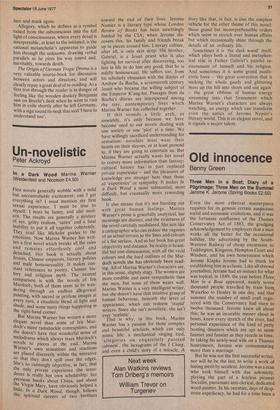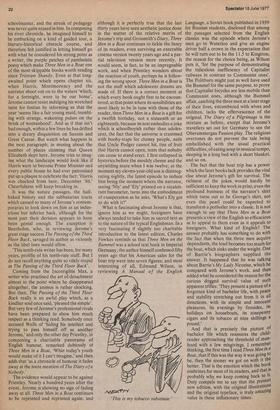Old innocence
Benny Green
Three Men In a Boat; Diary of a Pilgrimage; Three Men on the Bummel Jerome K. Jerome (Spring Books £2.50)
Even the most ethereal masterpiece requires for its genesis certain auspicious social and economic evolutions, and it was the fortunate confluence of the Thames Conservancy Act of 1883, the grudging acknowledgement by employers that a man works all the better for the occasional holiday, the advertising by the SouthWestern Railway of cheap excursions to Teddington, Kingston, Hampton Court and Windsor, and his own honeymoon which Jerome Klapka Jerome had to thank for establishing him as a classic. Like all shrewd journalists, Jerome had an instinct for what was topical; in 1889, the year before Three, Men in a Boat appeared, nearly seven thousand people travelled by train from Waterloo to Henley in one day, and that summer the number of small craft registered with the Conservancy had risen to twelve thousand. Jerome knew all about this; he was an incurable messer about in boats, knew every stretch of the river, had personal experience of the kind of petty boating disasters which are apt to seem funnier and funnier as they recede in time. In taking his newly-wed wife on a Thames honeymoon, Jerome was consummating more than a marriage.
But he was not the first successful writer, nor will he be the last, to write a work of tasting merit by accident. Jerome was a man who took himself with due solemnity, playing the part of a fearless pioneer Socialist, passionate anti-clerical, dedicated word-painter. In his twenties, days of desperate expediency, he had for a time been a
schoolmaster, and the streak of pedagogy was never quite erased in him. In composing his river chronicle, he imagined himself to be embarking on a kind of guided tour, a literary-historical obstacle course, and therefore felt justified in letting himself go with what he considered his strong point as a writer, the purple patches of pantheistic poesy which make Three Men in a Boat one of the most skippable books worth reading since Tristram Shandy. Even at that longawaited point which opens chapter six, when Harris, Montmorency and the narrator shoot out on to the waters 'which, for a fortnight, were to be our home', Jerome cannot resist indulging his wretched taste for fustian by informing us that the year 'seems like a fair young maid, trembling with strange, wakening pulses on the brink of womanhood'. And as if that isn't bad enough, within a few lines he has drifted into a dreary disquisition on Saxons and Great Caesar. But watch what happens in the next paragraph; in musing about the number of places claiming that Queen Elizabeth slept here, Jerome tries to imagine what the landscape would look like if Harris were to become Prime Minister and every public house he had ever patronised put up a plaque to celebrate the fact: 'Harris was chucked from here, December '86.' Cheerfulness will keep breaking in.
It was the nature passages, the halfbaked history and the sabbatarian tracts which caused so many of Jerome's contemporaries to look down on him as an industrious but inferior hack, although for the most part their derision appears to have been genial enough. The exception is Beerbohm, who, in reviewing Jerome's great stage success The Passing of the Third Floor Back, savaged its author as viciously as the libel laws would allow.
'This tenth-rate writer has been, for many years, prolific of his tenth-rate stuff. But I do not recall anything quite so vilely stupid as The Passing of the Third Floor Back'.
Coming from the Incorrigible Max, a writer who practised the art of detachment almost to the point where he disappeared altogether, the animus is rather shocking. But then, The Passing of the Third Floor Back really is an awful play which, as a kindlier soul once said, 'pleased the simple'. But very few of Jerome's professional rivals have been prepared to show him much respect as a thinking reed. Somebody once accused Wells of 'hiding his intellect and trying to pass himself off as another Jerome,' and only the other day Priestley, in composing a charitable panorama of English humour, remarked dubiously of Three Men in a Boat, 'What today's youth would make of it I can't imagine,' and then adds that 'as a chronicle of humour it fades away at the mere mention of The Diary of a Nobody.'
The evidence would appear to be against Priestley. Nearly a hundred years after the event, Jerome is showing no sign of fading away at all. Three Men in a Boat continues to be reprinted and reprinted again, and although it is perfectly true that the last thirty years have seen aesthetic justice done in the matter of the relative merits of Jerome's trip and Grossmith's Diary, Three Men in a Boat continues to tickle the fancy of its readers, even surviving an execrable cinema version twenty years ago and a partial television version more recently. It would seem, in fact, to be an impregnable work, and when Priestley wonders about the reaction of youth, perhaps he is following the wrong spoor. Three Men in a Boat is not the stuff which adolescent dreams are made of. If there is a correct moment at which every book ought first to be encountered, at that point where its sensibilities are most likely to be in tune with those of the reader, then Three Men in a Boat is a gift for a twelfth birthday, not a sixteenth or an eighteenth, because its text embodies a joke which is schoolboyish rather than adolescent, the fact that the universe is crammed with booby-traps for clumsy people, nails that Uncle Podger cannot hit, tins of fruit that Harris cannot open, tents that noboby can cause to stand erect. I first collapsed in hysterics before the mouldy cheese and the unyielding maze when I was twelve; at the moment my eleven-year-old son is disintegrating nightly, the latest episode to reduce him being the moment where the narrator, seeing `Nly' and 'Ely' printed on a recalcitrant barometer, turns into the embodiment of exasperation as he asks, 'What's Ely. got to do with it?'
What is fascinating about Jerome is that, ignore him as we might, foreigners have always tended to take him as sacred text as to the nature of the typical Englishman. In a very fascinating if slightly too charitable introduction to the latest edition, Charles Fowkes reminds us that Three Men on the Bummel was a school text book in Imperial Germany; the author himself confessed fifty years ago that his American sales for the boat trip were into seven figures; and most interesting of all, Edmund Wilson, in reviewing A Manual of the English Language, a Soviet book published in 1959 for Russian students, disclosed that among the passages selected from the English classics was the episode where Jerome's men go to Waterloo and give an engine driver half a crown in the expectation that he will turn out to be the 11.5 to Kingston, the reason for the choice being, as Wilson puts it, 'for the purpose of demonstrating the ridiculous inefficiency of Capitalist railways in contrast to Communist ones'. The Politburo might just as well have used the Bummel for the same purpose, to prove that Capitalist bicycles are less mobile than Communist ones, although the Bummel affair, catching the three men at a later stage of their lives, encumbered with wives and children, lacks the effervescence of the original. The Diary of a Pilgrimage is the mixture as before, except that Jerome's travellers set out for Germany to see the Oberammergau Passion play. The religious overtones do not prevent the tale being embellished with the usual practical difficulties, of eating soup in musical tempo, sleeping in a long bed with a short blanket, and so on.
The fact that the boat trip has a power which the later books lack provides the vital clue about Jerome's gift for survival. The richness of the jokes would hardly be sufficient to keep the work in print; even the profound business of the narrator's shirt which turns out to be George's shirt, not even this pearl could be expected to transform a potboiler into a classic. It is not enough to say that Three Men in a Boat presents a view of the English so efficacious as to appeal to them even as it appeals to foreigners. What kind of English? The answer probably has something to do with the fact that when the three men acquire dependants, the load becomes too much for the boat, which sinks under the weight. One of Barrie's biographers supplied the answer. It happened that he was talking about Barrie's My Lady Nicotine, which he compared with Jerome's work, and then added what he considered the reason for the curious dogged survival value of such apparent trifles: 'They present a picture of a forgotten kind of bachelor life, with peace and stability stretching out from it in all directions, with its simple and innocent pleasures, its evenings by firesides, its holidays on houseboats, its ninepennY cigars and its tobacco at nine shillings a pound.' And that is precisely the picture of bachelor life which reassures the child reader approaching the threshold of manhood with a few misgivings. I remember thinking, the first time I read Three Men in a Boat, that if this was the way it was going to be, then the sooner we got on with it the better. That is the emotion which the book enshrines for most of its readers, and that probably why we keep coming back to it. Duty compels me to say that the present new edition, with the original illustrations and the original typeface, is truly anlazing value in these inflationary times.



































 Previous page
Previous page